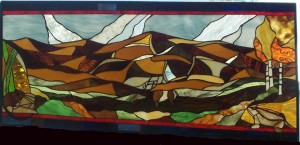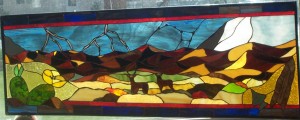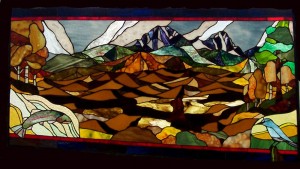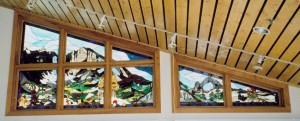This panels shows additional dunes fieldd, contrasted with the snowy spires of the Crestone Needles towering into the Colorado sky. Fall colors are visible in the distant landscape and more golden aspen frame one side. The Medano rushes by a mother brown bear and her cub, and on the far right is a ponderosa pine with a portion of the bark peeled off for medicinal purposes by Native American people. In the lower left corner is a cut-throat trout, found in the brooks and streams of the area and the lower right corner depicts the vibrant color of the mountain bluebird.
Archive for the ‘Public installations’ Category
Fourth Panel for Dunes….
Monday, November 9th, 2009Third Sand Dunes Panel
Tuesday, June 9th, 2009In the third panel of this project are found the highest dunes in the dune field, towering against the blue and white of the high valley sky.
Here are often found the “Chinese wall” effects along the tops of the dunes, formed when moisture and wind conditions are right for the phenomenon.
The Medano flows along the outer edge of the dune field, to later seep and disappear into the sands farther west.
A large bull elk grazes in the tall grass .
Among the animals found here are Ord’s kangaroo rat and the short-horned lizard, whose spiny camoflage fades perfectly into the sandy environment.
First Sand Dunes Panel
Tuesday, June 9th, 2009This is the first of the five panels to be installed in the visitors center of the Great Sand Dunes National Park & Preserve near Alamosa CO.
This panel depicts the wetland areas which edge the western side of the dune field. This area has an abundance of wildlife and shown are sandhill cranes in flight and the pronghorn antelope.
The corner insets feature the sunflower on the left, whose blossoms blanket the open field surrounding the dunes with a carpet of brilliant yellow for most of the summer season. Also found only in this vicinity is the Great Sand Dunes tiger beetle, with its iridescent carapace.
In the lower right corner is a pair of sandhill cranes, whose migratory path leads them to graze in fields of the San Luis Valley in the in the early spring and again in the fall. These magnificent birds can reach 46″ in height and can have a wingspan of over 6 feet. Their calls can frequently be heard before they become visible when the flocks pass overhead.
Second Dunes Panel
Monday, June 8th, 2009This is the second panel of the Great Sand Dunes project.
Depicted is lightning striking the dunes, which results in ‘fulgarite’ formations made when the electricity from the lightning melts the silica in the sand, and the big dipper, which represents the “night Sky” program in the NPS.
Here also are mule deer, very numerous in the area. The corner inserts are yellow Elephant ear cactus on the left and Indian points representative of those found at various sites around the San Luis valley.
Artist-in-Residence at Great Sand Dunes!!!
Sunday, May 24th, 2009Right around Christmas of last year I was approached by Art Hutchison, the Superintendent of GSDNP&P and asked if I would consider doing an installation for the Visitor Center similar to the one I did the previous fall at Great Basin. This project would be a bit smaller; around 28 sq. ft.
Since my installation at Great Basin had been featured on the web-page of the NPS site, I have had a couple of interested inquiries.
After further planning & a few meetings, it was agreed that the “Friends of the Dunes” would purchase the supplies, and I would donate my time and skill in exchange for the title of AIR.
As this park is practically in my own backyard here in the beautiful valley where I have made my home for nearly 40 years, I am once again humbled by the honor of creating work to be a part of our great National Parks.
An Ending
Thursday, November 20th, 2008The installation went smoothly and with no major mishaps. The potluck was wonderful and I was so glad to be able to introduce my family to the great people I have met and worked with here.
I am pleased with my work, and upon final inspection after installation, found nothing I would change. Often I am my own worst critic.
I will always remember this experience and all the people who helped make it possible. I am a lucky woman indeed.
Week 6: Almost complete!
Tuesday, November 11th, 2008I begin to cut the final panel of this project.
This piece features the bristle-cone pines growing from the rocky slopes, the Wheeler Peak snow-field/glacier and a final branch of golden aspen leaves.
At this point I can’t wait to have the whole series out of my cabin windows and installed permanently at the visitors center. Until that is accomplished, I will be anxious.
The park is hosting a potluck on Nov. 13th for the presentation of the project. By then my husband and son will be here to spend a few days and help me pack up.
Week 5: Petroglyphs
Monday, November 3rd, 2008Week 4: More time to finish the work
Monday, October 27th, 2008The remaining four panels include the three largest, and even though my palette is determined and I have plenty of materials, I am certain I will need additional time—which the park readily grants me. I now have until November 15 and I feel much relieved.
I finish the mountain peak and sky, and start on the three final panels. Each of these has icons of the park included not only in the main body, but in the self-frame margins as well.
The panel with “The Heart of the Mountain;” a geological feature, includes the other half of the cave portion, as if the cavern is hidden under the mountainside. Also included are fruits from the pioneer orchard. The native pine & brilliant fall aspen complete the piece.
Week 3: Building the panels
Tuesday, October 21st, 2008My final draft is approved by members of the staff; I immediately make my patterns and begin cutting.
This part will progress rapidly, as I can work at my own speed, for as long each day/night as I wish. I have brought 1½ crates of glass with me, as well as many boxes of scrap, so am confident of having all types and colors I need.
The first panel I produce includes Indian Paintbrush, a lizard, an Indian relic and Notch Peak. I have designed a “self-frame” around the entire project; I use it quite frequently as I find it gives a finished look to the work.
The second panel—the smallest—is of the Big Dipper, symbolizing the “Night Sky” program featured in many of the National Parks, honoring dark skies, which are becoming a rarity with today’s light pollution.
The third depicts Lexington Arch and a portion of Lehman Cave, and the fourth is the “Thumb”, the cliffs and sky above that part of the summit.
I am pleased that the finished panels fit into the windows of my cabin, where they will remain until installation.
Even with the freedom from my normal daily life, and being able to set my own work pace doing what I truly love doing, I am beginning to see that it will be impossible to finish this project in the time allotted to me.












